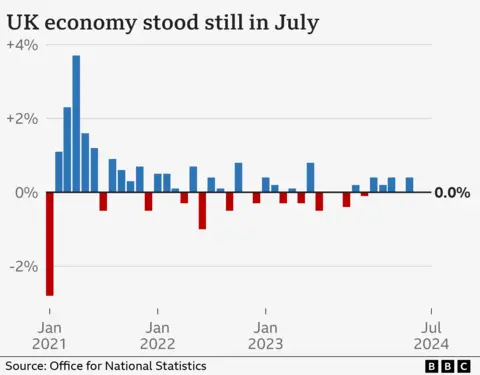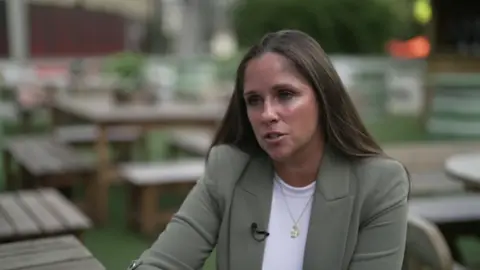 Getty Images
Getty ImagesThe UK unexpectedly failed to grow in July, after flatlining in June, official figures showed.
Analysts had forecast slight growth of 0.2% for the month of July.
A summer of sport, including the Euros and the Olympics, helped boost the services sector, but production and construction output both fell.
Another month without growth presents a challenge for the new Labour government, which has made boosting the economy a priority.
Despite the lack of growth in July, Liz McKeown, director of economic statistics at the Office for National Statistics (ONS) said “longer term strength in the services sector meant there was growth over the last three months as a whole”.
Services growth was led by computer programmers and the health sector, which recovered from strike action in June. But there was a drop in output for advertising, architects and engineers, Ms McKeown added.
It was a “particularly poor” month for car and machinery firms, she added.
The ONS monitors GDP – or gross domestic product – on a monthly basis, but more attention is paid to the trend over three months.
Monthly figures are an early estimate and are often revised slightly after more data comes in.
At the end of last year the UK fell into a shallow recession, with the economy failing to grow for two three-month periods in a row. But the first half of 2024 saw a return to growth.

The new government, which took office at the start of July, has said it wants to make the UK the fastest growing economy in the G7.
Chancellor Rachel Reeves said she was “under no illusion” about the scale of the challenge, but said she would “be honest with the British people that change will not happen overnight”.
Lower growth also means a smaller tax take, giving the government less room for manoeuvre in the Budget coming up in October.
“The economy stagnated in July… but that doesn’t mean the UK is on the cusp of another recession,” said Ruth Gregory at Capital Economics.
“And we can take some comfort from the fact that services output rose by 0.1% month on month.”
‘We’ve had a really great summer’

The ONS said retailers and hospitality venues noted an uptick in business in July as the England men’s football team progressed through the European championships.
Gillian Fletcher, general manager for Spinningfields, which runs food and drink venues in Manchester, said they had screened the Euros, Wimbledon and the Olympics over the summer and had found people were “in the market” for that kind of experience.
“It’s not that people don’t want to spend money or they don’t want to go out. It’s just the economic landscape has changed,” she said.
“We’ve had a really, really great year and summer… and that’s proof that if you’ve got the right recipe, people will come.”
However, some restaurants told the ONS the football tournament had had a negative impact on footfall.
Despite some travel agents seeing an increase in bookings because of the Paris Olympics, overall bookings fell month on month, the ONS said.


